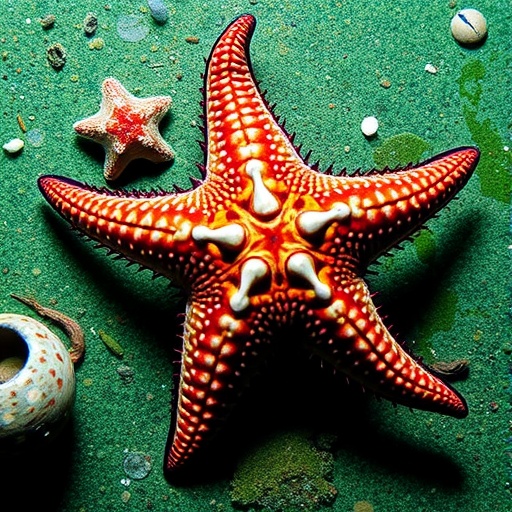Researchers at the forefront of marine biology have unveiled groundbreaking findings regarding the dietary habits of juvenile crown-of-thorns sea stars, a significant species impacting coral reef ecosystems. In their study, published in the esteemed journal Coral Reefs, they delve into how these young herbivorous sea stars influence not just their own growth and survival, but also the crucial transition to a corallivorous diet. This discovery holds immense implications, as the crown-of-thorns sea star is notorious for its role in coral degradation, leading to significant ecological shifts within marine environments.
Understanding the diet of juvenile crown-of-thorns sea stars has been a focal point for researchers due to the species’ potential to devastate coral populations. The researchers conducted a series of controlled experiments and field observations, revealing that the herbivorous diet of young sea stars plays an essential role in their overall development, shaping both their physical growth rates and survival metrics. Consequently, these findings indicate that the early dietary choices of juvenile sea stars not only affect their immediate health and vitality but could also have far-reaching consequences on coral reef dynamics.
The research team meticulously tracked the growth of juvenile sea stars from different dietary backgrounds. Those that consumed more diversified herbivorous diets exhibited significantly improved growth rates compared to their counterparts fed on monocultures. This observation lends weight to the hypothesis that nutritional variety may be pivotal in the early life stages of these sea stars. The implications of this are profound; if a juvenile sea star is not provided with a balanced diet, it could be stunted in growth, ultimately affecting its ability to transition to corallivory in adulthood which is a critical phase for their survival and impact on the ecosystem.
Moreover, the timing of the ontogenetic shift—the transition from an herbivorous to a corallivorous diet—was also found to be closely linked to the dietary conditions during juvenile stages. This is crucial, as earlier transitions can lead to increased predation on coral tissues, exacerbating the decline of coral reef health. The findings suggest that the nutritional phases in juvenile life are not merely phases of growth but are instrumental in dictating future feeding behaviors, survival tactics, and overall ecological roles of these pivotal marine stars.
Interestingly, the research highlighted that the environmental conditions in which juvenile sea stars thrive greatly influence their dietary preferences and growth trajectories. Factors such as water temperature, salinity, and the availability of food sources were shown to have significant impacts. Sea stars living in nutrient-rich environments exhibited enhanced growth compared to those in harsher conditions. This intricate relationship emphasizes the broader ecological implications of environmental degradation and its potential to alter species dietary patterns and survival strategies.
The methodological frameworks employed in this study were both rigorous and innovative. Researchers used a combination of lab experiments and in-field studies to gather comprehensive data, blending statistical analysis with ecological modeling to present a well-rounded understanding of juvenile sea stars’ growth dynamics. By integrating various data streams, they were able to establish correlations between diet, growth, and the timing of the shift to corallivory with unprecedented clarity.
As marine ecosystems continue to face the pressures of climate change and anthropogenic impacts, understanding the adaptive capacities of species like the crown-of-thorns sea star becomes ever more critical. The findings from this study are a clarion call for marine conservationists, urging a deeper investigation into the nutritional ecology of juvenile life stages among various marine species. Such insights could inform management practices aimed at bolstering coral reef resilience against invasive species like the crown-of-thorns sea star.
The implications extend towards understanding potential interventions that may help mitigate the harmful impacts of this species on coral reefs. If managers can enhance juvenile growth through habitat restoration efforts that provide better nutritional conditions, they could potentially influence the broader coral reef ecosystem’s health. For instance, promoting the growth of algae and other food sources could be a strategic approach to supporting healthy juvenile growth rates and delaying their shift to a coral-eating diet.
Furthermore, the findings also spark debate regarding the future of coral reefs under changing environmental conditions. With rising ocean temperatures and increasing pollution levels, understanding how these factors affect juvenile crown-of-thorns sea stars must be prioritized. Continuous monitoring and research are needed to ascertain the adaptive potential of this species and similar organisms facing the dual pressures of climate change and habitat destruction.
In conclusion, the research conducted by Llarena et al. offers significant insights into the intricate relationship between diet and the growth of juvenile crown-of-thorns sea stars. This study not only reaffirms the critical link between nutrition and survival in marine species but also calls attention to the urgent need for conservation efforts aimed at preserving coral reef ecosystems. By fostering more resilient juvenile populations through optimized dietary conditions, there may be a feasible pathway to reversing some of the ecological damage wrought by these voracious sea stars.
As marine biologists continue to disentangle the complexities of marine ecosystems, studies like these illuminate pathways forward in maintaining the delicate balance within coral reefs. As the fight against coral degradation intensifies, understanding the dietary preferences and growth patterns of these juvenile sea stars becomes a pivotal element in marine ecology and conservation strategies aimed at preserving our planet’s vital underwater landscapes.
Subject of Research: Dietary impact on growth and survival of juvenile crown-of-thorns sea stars
Article Title: Diet of herbivorous juveniles modulates growth, survival, and the timing of the ontogenetic diet shift to corallivory in crown-of-thorns sea stars
Article References:
Llarena, D., Cabrera, M.C.G., Doll, P.C. et al. Diet of herbivorous juveniles modulates growth, survival, and the timing of the ontogenetic diet shift to corallivory in crown-of-thorns sea stars. Coral Reefs (2025). https://doi.org/10.1007/s00338-025-02783-x
Image Credits: AI Generated
DOI: https://doi.org/10.1007/s00338-025-02783-x
Keywords: crown-of-thorns sea stars, juvenile diet, coral reefs, growth, survival, corallivory, marine ecology, conservation strategies, environmental conditions, dietary impact, coral degradation, ecological dynamics.




